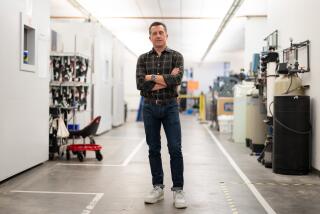Amerigon Seeks Backing to Power Its Electric Vehicle Component Line : Investment: Heavy losses bring skepticism, however, that the firm will be viable even if it is able to raise $12 million by going public.
- Share via
Dr. Lon E. Bell, the controversial scientist and businessman at the forefront of attempts to develop an electric vehicle component industry in California, is taking his dream public.
Through an initial public stock offering, Bell is hoping to raise up to $12 million in capital for Amerigon Inc., his fledgling, Burbank-based automotive component firm. Two million shares will be floated at a proposed maximum price of $6 a share.
Bell, who has loaned Amerigon more than $2 million of his own money, currently owns 88% of the stock and will retain majority control of the company after the offering. His stake could be worth up to $21 million.
The Caltech-trained innovator, whom some have portrayed as an icon of Southern California’s economic recovery, has in the past two years founded both Amerigon and the consortium Calstart to foster the new electric car industry.
Calstart, which is financed by consortium members, the federal government and the state, has amassed $20 million in funds and contracted with 40 companies, including Amerigon, to develop electric vehicle components.
After briefly serving as Calstart’s unpaid president, Bell stepped aside last fall when Mike Gage, former director of the Los Angeles Department of Water and Power, took over.
But the prospectus for the offering, filed with the Securities and Exchange Commission, details the close links that bind Amerigon and Calstart.
Amerigon is developing two products for electric cars--an energy management system and an air-bag safety system--and an automated navigation system and a heating-cooling system for car seats that can be used in conventional vehicles. It estimates that by the year 2003, about 300,000 electric vehicles will be sold annually by major manufacturers.
Its main focus so far, however, has been designing Calstart’s Showcase Electric Vehicle, a $5-million project intended to show off California-bred technology and products to future producers of electric cars. The three-seat, showcase sedan--consisting of prototype components made by Amerigon and other Calstart members--was first unveiled at the Los Angeles Car Show in January and then at trade shows in Geneva and Tokyo.
According to the SEC document, Calstart agreed in February to pay Amerigon more than $1.1 million as reimbursement for expenses incurred by the Showcase program. By the end of last year, Amerigon had received more than $700,000 in federal funds through the consortium, accounting for about 38% of its total accumulated revenue.
Since June, 1992, Amerigon has been leasing office space at no cost from Calstart in an idled Burbank defense plant formerly occupied by Lockheed Corp. Calstart, whose lease expires in a year, does have the contractual right to charge rent at any time.
Despite Calstart’s backing, Amerigon’s financial future appears tenuous. The company had accumulated net losses of over $2 million by the end of last year. As a result, independent auditor Price Waterhouse states in the prospectus, there is “substantial doubt about (the company’s) ability to continue as a going concern.”
According to the prospectus, stock sale proceeds will be used to fund operations for 12 to 18 months. After that, “the company will in all likelihood require additional financing.” It also states that “automobile manufacturers may be reluctant to purchase key components from a small, development-stage company with limited financial and other resources” and that the firm’s products are “dependent upon market acceptance of electric vehicles, of which there is no assurance.”
Another cloud may be lurking on Amerigon’s horizon. When Bell sold Technar Inc., an automotive parts supply firm, to TRW Inc. in 1986, he entered into a non-competition pact that expired April 15.
Although Amerigon said in the SEC prospectus that none of the technologies sold to TRW were used to develop Amerigon’s products, it added, “There can be no assurance that TRW will not make a claim under the non-competition agreement.”




